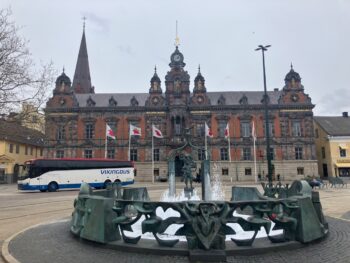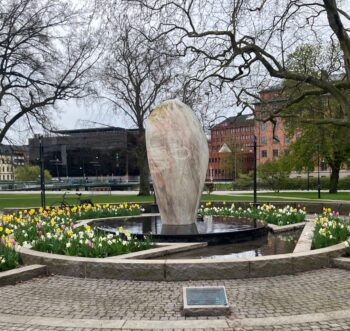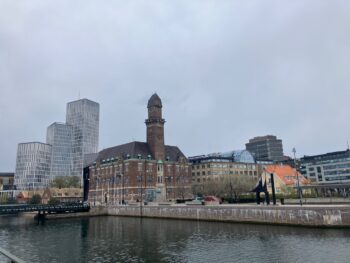We are developing the social individualist meta-context for the future. From the very serious to the extremely frivolous... lets see what is on the mind of the Samizdata people.
Samizdata, derived from Samizdat /n. - a system of clandestine publication of banned literature in the USSR [Russ.,= self-publishing house]
|
“University of Oxford museum hides African mask that ‘must not be seen by women’”, reports Craig Simpson in the Telegraph:
A University of Oxford museum will not display an African mask because the culture which created it forbids women from seeing it.
The decision by the Pitt Rivers Museum is part of new policies in the interest of “cultural safety”.
The museum has also removed online photos of the mask made by the Igbo people in Nigeria, which would originally have been used in a male-only ritual.
Masks are a central part of Igbo culture, and some masquerade rituals carried out by men wearing the ceremonial objects are entirely male-only and carried out in secret away from female spectators.
The new policy, a first for a major British collection, comes as part of a “decolonisation process” at the Pitt Rivers Museum, which is aiming to address a collection “closely tied to British Imperial expansion”.
I am not necessarily against the curators’ decision. Most of us can think of items that are literally or metaphorically sacred to us that we would not wish to see displayed to the crowd. What I do not understand is why the desire of long-dead Igbo men to conduct certain rituals away from the female gaze is to be respected, but the desire of living British men to do the same is to be scorned.
Related post: In defence of all-{insert variable of choice} clubs
“This is the zombie apocalypse”, tweeted Shoshanna Keats Jaskoll. “You need to watch this.”
You do need to watch it. The “zombie apocalypse” is jokey fiction. This is real and not funny. It happened in New York a few days ago.
Here is the same scene from a different angle. The tweet by Drew Pavlou says,
This is genuinely blood-curling.
Hamas murdered 364 Jewish civilians at the Nova music festival – one of the worst terrorist massacres in modern history. And people in New York City actually celebrate the bloodshed with zombie like call-and-response chants defending the massacre
The speaker leading the chants is not the woman with the long hair, as I thought at first, but the woman intermittently visible on the left wearing a Muslim hijab-and-keffiyeh combination over a combat shirt and black jeans. Judging from their clothing, the crowd is a mixture of Muslims and Leftists. Compiled from both video clips, here is my transcript what the leader and the crowd said,
Leader: “Fuck the Nova music festival”
Crowd: “Fuck the Nova music festival”
Leader: “AKA the place”
Crowd: “AKA the place”
Leader: “where Zionists decided to rave”
Crowd: “where Zionists decided to rave”
Leader: “next to a concentration camp”
Crowd: “next to a concentration camp”
Leader: “That’s exactly what this music festival was.”
Crowd: “That’s exactly what this music festival was.”
Leader: “It’s like having a rave”
Crowd: “It’s like having a rave”
Leader: “Right next to the gas chambers”
Crowd: “Right next to the gas chambers”
Leader: “during the holocaust”
Crowd: “during the holocaust”
Pro-Palestinian activists like this style of repeating chants. I think it is because they feel they need not take responsibility for their own words if they are just repeating what their leader said a second ago. Here is another recent example, posted by “KosherCockney”.
The video shows a bunch of supporters of the Palestinians, their faces hidden by keffiyehs or black ski masks, who have evidently just poured into a New York subway carriage. The ordinary travellers stand rigid or sit hunched with their eyes down, trying to avoid being selected.
The leader of the pro-Palestinians says, “Raise your hand if you’re a Zionist.”
Activists: “Raise your hand if you’re a Zionist.”
Leader: “This is your chance to get out.”
Activists: “This is your chance to get out.”
Understandably, none of the travellers raise their hands.
The progressive says with satisfaction, “OK, no Zionists. We’re good.”
I do not think it is an exaggeration to hear in that sentiment an echo of the Nazi term “Judenfrei”.
I do not know the exact political views of Matthew Syed, but I assume he stands at some “sensible” position in the spectrum from Blairite to Cameronite. All the more credit to him, then, for naming their duplicity for what it is.
Farage is a snake, but if we were honest on migration he’d have no fangs
[…]
Hordes of journalists, camera crews and podcasters (including Emily Maitlis and Jon Sopel from The News Agents) were there to witness Farage and analyse his appeal. For many in the centre ground the answer is obvious: he draws his success from the bigotry, racism and gullibility on the fringes of polite society. Alastair Campbell has called him a “dangerous demagogue”, and on the radio last week a former adviser to David Cameron contrasted the “superficial showman” with the statesmanship of his own former boss. In The Times Daniel Finkelstein said Farage promised “chaos”, unlike the sensible Sunak.
Permit me to offer a different interpretation of the man who has arguably exerted more influence on British politics than anyone else over the past two decades, despite not winning a seat, and who is set to be a protagonist in the fight for the soul of the Tory party after the election, regardless of whether he wins in Clacton. Farage draws his power not principally from racism (as the son of an immigrant, I can testify that Britain has made great strides on bigotry) or gullibility. Rather, he draws it from deceit.
I am not talking about his own deceit, mind you, although he is more than capable of it. I am talking about the duplicity of the very people who now castigate him: the acolytes and promoters of Tony Blair, Cameron and the others who have held power these past few decades. I say this having gone back to the main party manifestos during the period of Farage’s rise and what they said about the issue he has made his own: immigration. And, as you might expect, and as Farage has consistently claimed, I saw lie after lie.
Don’t, for the moment, consider whether mass immigration is a good or bad thing; instead focus on a point that I hope we can all — left, right, rich, poor, black, white — agree on: the importance of truth-telling. It was Aristotle, after all, who intimated that without some minimum level of candour a polity cannot survive.
Now, consider that Blair said in 1997 that he would ensure “firm control … properly enforced” — and then presided over an intake of 633,000 between 1998 and 2001. In 2005 he said that “only skilled workers will be allowed to settle long term” and promised “an end to chain migration” — and then net migration reached over quarter of a million despite a deep recession, not least because of movement from the new EU states. The government claimed this would be a trickle of 13,000 migrants a year; it turned out to be 1,500 per cent higher.
But if this was merely deceitful, it is difficult to locate the term for what followed. In 2010, 2015 and 2017 the Tories promised to cut immigration to the tens of thousands. In every manifesto. In ink. What happened? Immigration rose to an average of 300,000 a year over the period, totalling over 1.4 million for 2022-23 — a period in which free movement had ended and a high proportion of the intake were dependants of low-wage workers from non-European nations.
People often wave such figures away, saying: “Oh, Britain has always been a nation of immigrants”, which is perfectly true. But if you look at a graph of inflows over the past thousand years, let alone the past hundred, this represents a spike of an unprecedented kind, something that will echo decades — perhaps centuries — into the future. Again, whether or not you think this inflow is overall a good or bad thing, you can’t deny that it has altered the complexion of the UK in ways both subtle and profound.
Now consider another trend over roughly the same period: trust in politics has plummeted to lows that are, again, unprecedented. This may sound a minor issue but it is anything but. Advanced social science tells us trust was the secret to the rise of the West, the invisible forcefield that incubates a healthy, prosperous society. But now we in the UK are living through an age in which trust is slowly — almost imperceptibly — dissipating from public life.
There I must disagree with Mr Syed: the dissipation of trust is no longer slow. That loss of trust is one of the things that has made me much less pro-immigration than I once was. If that means the loss of my Libertarian purity certificate, so be it. I see a similar change in many others. We used to talk expansively about how we did not trust the state one inch, but I think in secret we did trust the bureaucrats and the politicians to be responsible gatekeepers. We no longer do. Inevitably, that means we want stronger gates.
If you feel my “we” above does not include you, feel free to explain why in the comments. My old self, the one that hovered on the edge of being an advocate for the abolition of borders, is still in there somewhere, pleading to be reconvinced.
…A charismatic politician – once a supporter – is now it’s greatest foe. It’s members have abandoned the beliefs that made the party an electoral force. It’s enemies smell blood. Annihilation beckons.
I am, of course, talking about 1924. The party is the Liberal Party. The politician is Winston Churchill. The beliefs are liberal beliefs: property rights, low taxation, low regulation, sound money.
At this point the similarities with anything more modern start to end. The great shift in politics over the previous quarter of a century had been the rise of the Labour Party. Helped by the socialist take over of the trade unions and the extension of the franchise, Labour found themselves in government albeit as a minority administration.
The Liberal response to the rise of the Labour Party had been to steal its clothes. Hence, Lloyd George’s People’s Budget of 1909. This introduced state pensions, a state-run GP service and a limited unemployment benefit scheme. Worse still, a lot of the Liberal Party’s members gave up on the very idea of liberalism. Hence Lord Haldane, one-time Liberal Minister of War could became a Labour Lord Chancellor.
Churchill’s role in this was to identify socialism as the great threat. His argument was that Liberals and Conservatives (or Unionists as they tended to call themselves in those days) needed to put aside their differences to fight the greater enemy. As I write this, a hundred years ago Churchill is inching his way towards becoming a Conservative but – Churchill being Churchill – his first step in that journey is to fight a by-election against an official Conservative candidate.
Colchester always looks prosperous when I go there. There are designer clothes at prices I cannot afford in its charity shops. I think of it as a place where the last serious incident of anti-social behaviour was in AD 61. Not so, according to the Telegraph:
How libraries changed from local sanctuaries to antisocial behaviour hotspots
All the crime in British libraries has traditionally been contained between the covers of our books – any rowdiness instantly quelled by the librarians’ famous “Shh!”
But in Colchester, Essex, that idyll increasingly resembles fiction. Over the past three months, the city’s local library has recorded a shocking 54 incidents of antisocial behaviour, forcing librarians to consider donning bodycams for their own protection.
Books have been snatched from the shelves, tossed about and destroyed. An irreplaceable collection of local 18th-century maps has been defaced with obscene sketches. A glass door has been shattered, fires have been lit on the carpet tiles of the quiet study area and staff have been subjected to appalling verbal abuse and – on one occasion – a physical assault.
Non-paywall version of the story here.
It continues,
Perhaps most worrying of all, however, is that the Essex librarians are far from alone, with similar learning sanctuaries across the country now battling a wave of criminality and disorderly behaviour.
In Kent, such institutions witnessed a 500 per cent increase in antisocial incidents affecting staff and library users between 2020 and 2023, while in Bristol, several libraries were forced to close or change their opening hours over the school holidays last year to deter unruly young visitors.
Note the timeframe. I suspect that this startling 500% increase in antisocial incidents in Kent public libraries between 2020 and 2023 was a ripple from the Black Lives Matter tsunami finally making landfall after crossing the Atlantic. However that is but the latest book in a multi-volume saga. The article speaks of any rowdiness being ‘instantly quelled by the librarians’ famous “Shh!”’ When did that last happen, 1975? Perhaps there really were Shh-ing librarians like that once. My imagination gives them beehive hair and cat-eye glasses. Never actually saw one though, and in the 1980s I spent vast amounts of time in the local public library. All my life, trendy young librarians lived in terror of being thought to be that sort of librarian, and the fear never went away while they gradually turned into old librarians who’ve still got their CND badges in a drawer somewhere.
No longer the silent book storage and study areas of old, libraries have evolved to become “community hubs” offering a wide range of free or affordable services to visitors of all ages. You can go to a library to access the internet and use printers and photocopiers. They host knitting clubs, manga drawing sessions and bereavement support meetings. Often they’ll loan out medical equipment such as blood pressure monitors, with many becoming Covid vaccination centres during the pandemic. A new Scottish scheme even offers up musical instruments for users.
In Colchester’s library, parents and grandparents are supervising toddlers clambering around a small soft play area situated on the two-storey building’s ground floor.
There is nothing wrong with the manga drawing or the soft play areas in themselves. Nor do I have any automatic objection to a library, in the sense of a place whose primary purpose is to make books available to the public, also hosting activities such as Drag Queen Story Hour, as Colchester library has done. Although I do think the famous Rainbow Dildo Butt Monkey whom Redbridge council commissioned to do the rounds of its children’s libraries in 2021 might have been a little off-putting to certain demographics.
If public, government-run libraries were private, commercially-run libraries as once existed in the UK – Boots the Chemist used to run a mass-market circulating library – we could have lively competition between the “We’re not your grandma’s library” libraries and the “We are your grandma’s library” libraries. I am sure there is room for both.
But that is a dream. In the real world, low as its fees were, “Boots Book-Lovers’ Library” could not compete with the government-subsidised version which proudly boasted it was free to all. And the generations of public librarians since then thought they were being non-authoritarian by taking that “to all” literally. “The library isn’t just about books”, they said. The banks of computers pushed the books into a corner. “The library isn’t just for swots”, they said. “We won’t make you stay quiet”, they said. It stopped being a quiet haven for swots. “We are inclusive”, they said. “The library is for all sorts of people.” And, lo, no one was excluded and all sorts of people came.
“Conservatives want to bring back mandatory national service”, reports the BBC:
Twelve months of mandatory national service would be reintroduced by the Conservatives if they win the general election.
Eighteen-year-olds would be able to apply for one of 30,000 full-time military placements or volunteering one weekend a month carrying out a community service.
Prime Minister Rishi Sunak said he believed bringing back compulsory service across the UK would help foster the “national spirit” that emerged during the pandemic.
Back to the good old days:
As I walked out on London street
A press gang there I chanced to meet
They asked me if I would join the fleet
On board of a man-o-war, boys
They said that a sailor’s life was fine
Good comrades and good pay I’d find
They promised me a bloody good time,
On board of a man-o-war, boys
– Traditional sea shanty
The press-ganged sailors of the Napoleonic wars often did fight well. That might have been due to their national spirit. Or it might have been due to the disciplinary methods detailed in the next two verses of the song:
But when I went, to my surprise
All they’d told me was shocking lies
There was a row and bloody old row
On board of a man-o-war, boys
The first thing they did, they took me in hand
And they flogged me with a tarry strand.
They flogged me till I couldn’t stand,
On board of a man-o-war, boys
The Home Secretary is already rowing back:
James Cleverly has insisted that “no one is going to jail” if they refuse to take part in National Service, but that the Tories would “compel” young people to participate.
Rishi Sunak last night vowed to create a mandatory scheme where school leavers will either have to enrol on a 12-month military placement or spend one weekend each month volunteering in their community.
But Mr Cleverly said that young people would not face any criminal sanctions if they did not take part.
Asked what would happen if someone said they didn’t want to engage, the Home Secretary told Trevor Phillips on Sky News: “There’s going to be no criminal sanction for this. No one’s going to jail over this…
“We want to make this compelling, we are going to compel people to do it, but also we want to make sure that it fits with different people’s aptitudes and aspirations.”
He added that “we force people to do things all the time” when pressed by the BBC’s Laura Kuenssberg about whether he was comfortable as a Conservative forcing teenagers to do something.
He told the BBC: “We force 16-year-olds who, as a society, for example, we recognise are not fully formed, and they still require education. So the decision was made that they remain in education or training.
“So we force teenagers to be educated. No one argues with that.
I argue with it.
Once upon a time we had God. God was someone to emulate; someone whose rules one should attempt to live by. Nowadays, in our secular age, we have anti-God a.k.a. Hitler. Hitler is all bad and we should do the precise opposite of what he said and did.
But is that the case? How bad would things be if Hitler were in charge?
It would not be great for freedom of speech. But then right now is not great for freedom of speech. It would not be great for Jews. But then right now is not great for Jews. And they do, at least, have somewhere to go nowadays.
He might want to start a world war. But he would be frustrated because we are already in a world war. But I think we can be pretty sure he would prosecute that war with rather more vigour than our current masters can muster.
Economically speaking, he would be a disaster. He is, after all, a socialist. He would do nothing about the debt, he would reduce trade and be constantly trying to pick winners. So not much change there. A lot would depend on how enthusiastically he embraced Net Zero. Nazis were appalling environmentalists. I suspect, however, that so long as there was a war to fight that would take priority.
I think we can be pretty sure that the small boats crisis would come to an end. The Volksmarine machine-gunning anyone in a small boat would be likely to put a damper on the people-smugglng trade. Similarly, I don’t think he’d have much time for illegal migration. Or legal migration for that matter. Quite the opposite. Fewer people around would mean lower house prices. So, that’s a Hitler win. Unfortunately, Hitler’s socialist economics would mean shortages of all sorts of things. So, you’d have a house but it wouldn’t have any windows.
He might initially have some trouble with activist judges. But given that he will have a majority in Parliament – Nazis are quite good at arranging that sort of thing – and given that via the Bill of Attainder, Parliament can execute anyone they don’t like without giving reasons, I don’t think the judges would prove much of an obstacle.
I don’t think he would have much time for DEI (or DIE as think we ought to start calling it) or the whole equality agenda. At very least that’s good news for the Garrick Club, if it can retain any degree of independence. OK, so the members would have to sing the Horst Wessel Lied every evening but who doesn’t like a good sing song every now and then? Especially, if it’s being led by prominent celebrities.
On that point, it would certainly be amusing to watch as the gobshites at the BBC and elsewhere in the establishment, heaped praise on the new government, claiming that it was their idea all along in their vain attempts to secure a party membership.
Communist indoctrination in universities would come to an end. To be sure it would be replaced by a different form of indoctrination but at least white men would not be being taught to hate themselves.
I don’t think he’d have a lot of time for Islamic terrorism or Islam in general. I think he’d put likely trouble-makers in concentration camps. Most would fall foul of his racial policies.
Art and aesthetics generally would be better. Who wouldn’t enjoy the sight of the Angel of the North being melted down to make 155mm shells? The remake of Love Thy Neighbour would be compulsory viewing. Literally.
The key thing is that by shifting the Overton Window, Hitler would be able to cut the Gordian Knot that makes doing anything at the moment almost impossible. It is amazing what you can achieve when you are prepared to lock up your opponents.
At this point, I should point out that a Hitler government may well turn out to be sub-optimal. But given the path towards an Islamo-communist tyranny we are currently on one would have to say it could be worse.
There is a fine article by James B. Meigs in City Journal: “Unscientific American – Science journalism surrenders to progressive ideology”
The article is framed around the decline of Scientific American but branches out into discussion of the decline of the scientific American, and, indeed the decline of the scientifically-minded citizen of the world.
You used to read about such people everywhere. You used to meet such people everywhere. Every nation had them, not that they set much store by nations. They were not scientists themselves, but they were scientifically-minded. They knew how to make a “crystal set” out of old bits of junk so they could build a clandestine radio in Stalag Luft III, and how to build a copper still if they fell through a timewarp. Their heroes were the scientists they read about in Scientific American and New Scientist, the ones who would not fudge an error bar to save their lives, the ones whose dogged refusal to let an anomaly go unexplained led to great discoveries.
They were good chaps, these not-quite-scientists. Well, most of them were chaps. I declare myself a sister of the brotherhood by repeating that the hypothesis that men are on average better at science was not disproved when Larry Summers was fired as president of Harvard for saying that the possibility should be considered. That was the point Summers was making: the true scientist is not afraid to follow the facts wherever they lead. And just behind the actual scientists in this quest came the journalists and popularisers of science and just behind them came the scientifically-minded men and women who thought the future would be full of people like them – but the future turned out differently…
One of the few science journalists who did take the lab-leak question seriously was Donald McNeil, Jr., the veteran New York Times reporter forced out of the paper in an absurd DEI panic. After leaving the Times—and like several other writers pursuing the lab-leak question—McNeil published his reporting on his own Medium blog. It is telling that, at a time when leading science publications were averse to exploring the greatest scientific mystery of our time, some of the most honest reporting on the topic was published in independent, reader-funded outlets. It’s also instructive to note that the journalist who replaced McNeil on the Covid beat at the Times, Apoorva Mandavilli, showed open hostility to investigating Covid’s origins. In 2021, she famously tweeted: “Someday we will stop talking about the lab leak theory and maybe even admit its racist roots. But alas, that day is not yet here.” It would be hard to compose a better epitaph to the credibility of mainstream science journalism.

The Sage of Kettering and I have been on another trip, this time to Copenhagen, obliging the self-loathing poster of that poster, with flits over the Øresund to Malmö and to Helsingborg in Sweden. On landing in Copenhagen’s pleasant airport, we immediately leave Denmark for Sweden by train, taking in the well-known bridge, onto which we emerge after a few minutes in a tunnel. It is an impressive piece of engineering. Bizarrely, well, to anyone from the UK, it was finished in time and within budget despite them finding over 20 WW2 bombs. At our first stop just over the bridge, the sign announces a check by the Swedish border guard, but nothing materialises.
We then emerge into central Malmö late lunchtime. It is all rather pleasant, none of this violence one hears about. Malmö, soon to host the Eurovision Song Contest, is a fine enough city, thinking back, reminiscent of Liverpool in some ways but without the decay seen today. There are many fine buildings, testament to a prosperous late 19th century.

We have a lunch of meatballs and beer at Gustav Adolphus square, outside in April,

before going to pay our respects at the Raoul Wallenberg park.

On the way back, we see a group of four police officers challenge some youths in the middle of a square.
The architecture here is mainly modern, but with lots of little gems.

In the Old Town core (Gamla Stan) it certainly has a nice feel to it.



→ Continue reading: An Øresund odyssey
A suggestion I have heard, made almost in jest but it might be true, was that Iran launching more than three hundred drones and missiles at Israel might have been intended as some weird form of de-escalation. The reasoning behind this theory is Iran knew perfectly well that the main effect of its attack would be to demonstrate just how good Israel’s air defences are, but that the expensive gesture would satisfy their own hawks without giving Israel any emotional reason to strike back.
I read somewhere that in nineteenth-century France most professional men could expect to be challenged to a duel at some time in their career. To refuse meant dishonour. To accept meant the prospect of death or serious injury, or the lesser but still significant unpleasantness of inflicting it on someone else. To deal with this problem the custom arose that by silent mutual agreement the splendid-looking duelling pistols used would have been made in very small calibres and taking only a tiny amount of black powder. When fired they produced a reasonable bang which carried with it enough prospect of doing harm to satisfy the honour of the duellists – but in practice wearing a thick woollen overcoat was usually enough to deflect the slow-moving ball.
Perhaps Iran was, or thought it was, acting like one of those duellists. If so, we shall have to see whether Israel is on board with the “silent mutual agreement” part of the analogy.
What do you think?
A week or so ago I posted about the case of Abdul Ezedi – the corrosive liquid attacker – and compared it with a similar case from a hundred years ago. Ezedi would appear to have been found in Mayor Khan’s makeshift morgue otherwise known as the River Thames. Meanwhile, a hundred years ago Ezedi’s counterpart’s case has reached a conclusion. This is from The Times of 29 February 1924:
At the Central Criminal court yesterday, EDITH LOUISA BASSETT, 30, was found Guilty of throwing corrosive fluid upon Arthur William Thompson, and upon three other persons, with intent to do grievous bodily harm to Thompson. MR. JUSTICE SHEARMAN sentenced her to three years’ penal servitude.
Only three years? But there’s a bit more to this woman:
After the jury had found the prisoner Guilty, Inspector Aldridge said she had a remarkable history. Throughout her life she had been of a violent disposition. In 1905 she was sentenced to 12 months’ hard labour for wounding with intent to murder. She had made the acquaintance of an omnibus driver and one night after he had stated that he wished to have nothing more to do with her she went on the top of his omnibus and cut his throat with a razor. In 1910 she married a man named Bassett. The marriage proved a unhappy one and the husband joined the Navy. She next met a wealthy young man, and saying that she was the daughter of a retired doctor, persuaded him to go through the ceremony of marriage with her. She was charged with bigamy and bound over. Later she went to Scotland and assaulted a gentleman whose son, she said, had failed to carry out his promise to marry her. The prisoner in 1914 was sentenced to 12 months’ imprisonment with hard labour at the Central Criminal Court for perjury in the name of Melville. In that case she had borrowed a person’s baby to obtain an affiliation order against a man. In 1915 she made the acquaintance of an Army officer, and told him that her father was a ranch-owner in Mexico, and induced him to marry her. She also married another officer, and in that case borrowed a baby to work on the generosity of the officer’s parents. For that bigamy she was sentenced to 18 months’ imprisonment.
I make that 4 weddings, 4 assaults and 3 jail sentences. The women of today yesterday…
The Guardian reports that
A senior official in Pakistan has admitted to election rigging amid protests breaking out across the country over claims that its general election results were unfair.
The confessional statement throws further questions over the legitimacy of the 8 February elections, which were marred by controversies and allegations of rigging in Pakistan.
Commissioner Rawalpindi Liaqat Ali Chatta told reporters that authorities in Rawalpindi, Punjab province, changed the results of independent candidates – referring to candidates backed by the former prime minister Imran Khan’s party – who were leading with a margin of more than 70,000 votes.
Chatta said there was so much “pressure” on him that he contemplated suicide, but that he then decided to make a public confession. “I take responsibility for the wrong in Rawalpindi. I should be punished for my crimes and other people involved in this crime should be punished.”
He also accused the chief election commissioner and the chief justice of Pakistan for their roles in the rigging. Chatta was arrested by police after the statement.
For those unfamiliar with Imran Khan, the currently jailed former prime minister and leader of the party against which Mr Chatta says the vote-rigging was directed, in the 1970s, 80s and 90s he had fans worldwide as one of the best all-rounders in cricket history. During this period he was “known as a hedonistic bachelor and a playboy who was active on the London nightclub circuit” as Wikipedia puts it. Then he went home to Pakistan and binned his previous liberalism like a used condom. He encouraged the strict enforcement of Pakistan’s blasphemy laws, and has pushed for insulting Muhammad to be made a crime all over the world. He is a hypocrite and a jerk. But those things do not change the fact that there is a strong prima facie case that his party should rightfully form Pakistan’s next government. His being in jail on an obviously trumped-up charge strengthens not weakens that argument.
The Guardian article was light on detail about how Commissioner Chatta (also spelled Chattha and Chatha, and I think the Guardian article is mistaken when it says his first name is Rawalpindi – it looks as if they have mixed up his name with his job title) says that the vote-rigging in which he participated was done. This article from Arab News gives more detail. It quotes him as saying,
“The wrongful act I have committed in this election [is that] we have made people, who had lost [the election], win 13 MNA (member of the National Assembly) seats from Rawalpindi. We have turned up to 70,000[-vote] lead of individuals into their defeat,” Chattha said.
“Even today, our people are putting fake stamps [on ballot papers]. I apologize to all my returning officers who were working under my supervision, who were crying when I was asking them to commit this wrongful act, and they were not willing to do it.”
I toyed with the idea of just posting about Pakistan, and leaving it up to the commenters to make the obvious parallels with the United States, but decided that would be a cop-out. → Continue reading: Senior election official admits vote-rigging
|
Who Are We? The Samizdata people are a bunch of sinister and heavily armed globalist illuminati who seek to infect the entire world with the values of personal liberty and several property. Amongst our many crimes is a sense of humour and the intermittent use of British spelling.
We are also a varied group made up of social individualists, classical liberals, whigs, libertarians, extropians, futurists, ‘Porcupines’, Karl Popper fetishists, recovering neo-conservatives, crazed Ayn Rand worshipers, over-caffeinated Virginia Postrel devotees, witty Frédéric Bastiat wannabes, cypherpunks, minarchists, kritarchists and wild-eyed anarcho-capitalists from Britain, North America, Australia and Europe.
|











